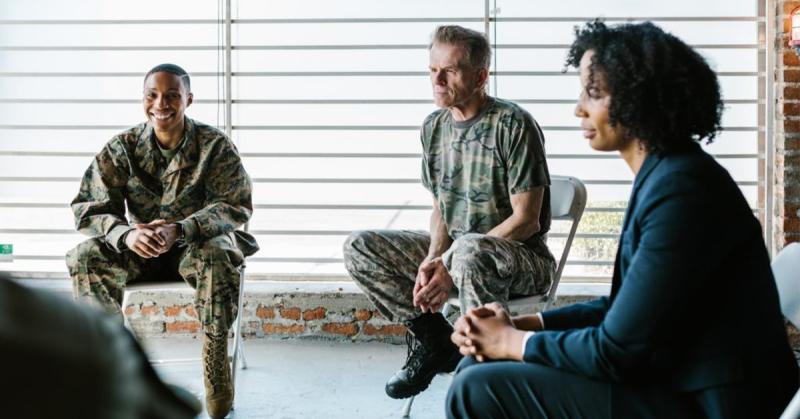Military Social Work
MSW course prepares social workers to meet the unique needs of veterans and active-duty military personnel and their families

The U.S. Department of Veteran’s Affairs (VA) is the nation’s largest employer of master’s-social workers, who are also employed throughout the military to provide mental and behavioral health care, connection to services, housing support and more in a wide range of settings. To prepare social workers to effectively meet the needs of the veteran and military population, University of Denver Graduate School of Social Work (GSSW) Professor of the Practice Stephanie George developed the course Advanced Clinical Skills for Working with Military Families.
Offered four times a year in the MSW@Denver online MSW program, the popular class is always filled. It is designed to give students an understanding of the issues military and veteran families face and how to apply that understanding to clinical interventions with military and veteran families. The course also delves into service member concerns, spousal/partner relationships, and family dynamics surrounding deployment, active duty, returning home permanently or between deployments, and post-deployment concerns such as PTSD and trauma.
Now GSSW’s associate dean for academic affairs, George previously worked for the VA for a decade, including serving as a national clinical coordinator. She says, “I recognized the need for MSW students to understand the population of veteran and military families and also the bureaucratic structure. I wanted students to understand what it was like being a federal government employee, to be a social worker working in that structure.” Because the MSW@Denver program enrolls active-duty military personnel, the course is tailored to their needs, and all course instructors have either served in the military or worked for the VA.
Current MSW@Denver online MSW student Caley Hodge is a U.S. Army staff sergeant who has served since 2018. Hodge joined the military because she wanted to give back to her country and enrolled in the MSW program because she wanted to give back to other soldiers as well.
Hodge was first introduced to social work when she sought help for her own anxiety related to a high-pressure military job and stressors such as relocating across the country. She says, “There’s a lot of trauma in serving. We often think about combat trauma, but we don’t always think about the trauma we may have come into the military with and how that’s exacerbated. And it’s not really normal to relocate your family every three years and be away from family.”
After seeking her own help, Hodge “started to see [social workers’] impact within our unit, not just helping the soldier but the whole family.” Hodge then discovered that the military employs social workers directly. This realization opened a potential new career path: After graduation in June 2026 with a focus on mental health and trauma, Hodge can apply to continue her military service as a social worker.
Suicide is the leading cause of death for U.S. soldiers, who are almost nine times more likely to die by suicide than in combat. Statistics such as this reinforce Hodge’s motivation to pursue social work and help to normalize mental health care for military service members. “[Social workers’] impact on the force is greater than what I can do in the job I’m in now. A lot of military members need someone to listen and help them process things they’re going through. If we had more of that, maybe the suicide rate would go down.”
Hodge adds, “The greatest thing this course opened my eyes to is how many people do care. That made the greatest impact. You think that nobody outside of the military cares. The class was completely full, and I was the only active duty; the rest just wanted to help military families and veterans.”
George explains that the job opportunities for students like Hodge are vast. “Whether you’re working for the Department of Defense [recently renamed the Department of War] or VA, there’s so much opportunity within the government structure. I did seven different jobs within 10 years. There’s so much variety: case management, therapy, foster care, psychosocial services, hospital inpatient, psych outpatient … It’s so expansive.” George notes that military/veteran social work experience is transferrable, allowing social workers to move among VA facilities. Importantly, the federal government requires licensure for only one state, so once a government social worker is licensed in one state, their licensure can transfer to another. There are also ample opportunities for advancement within the government structure.
George adds, “Working with military members and veterans is so rewarding ... To be able to give something back. I never knew I wanted to work for the VA, but I loved it.”




